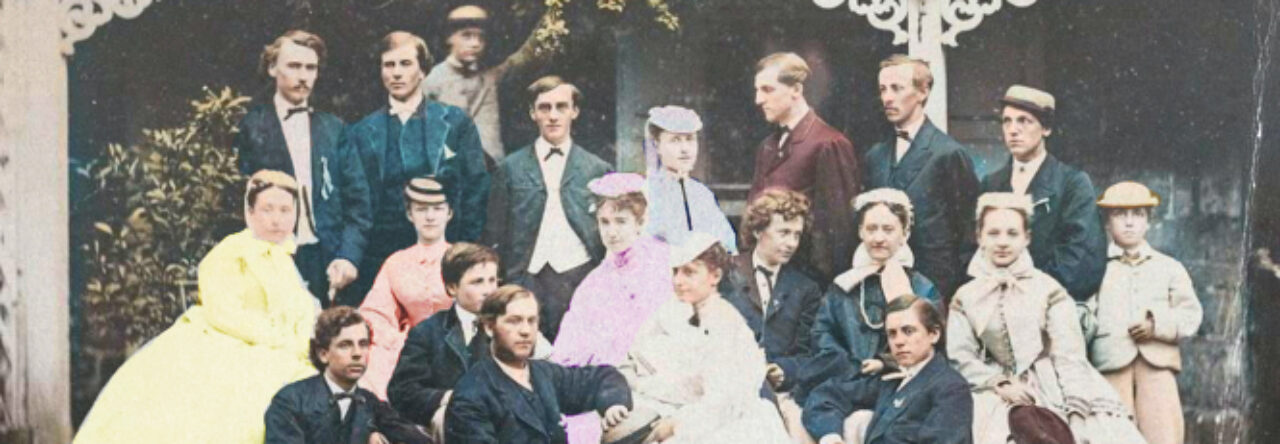When scanning through the 1905 Dickinson Alumni Record, nearly all of the members in the Class of 1858 had, “U. P. Society” or, “B. L. Society” in their short blurbs. While doing research about these abbreviations in the archives, the research assistant told me about the Belles Lettres and the Union Philosophical Society. These two literary societies had existed since the 18th century, which were the earliest days of the college. Both societies sought to enhance the intellectual development of students at the college, as well as create bonds between members. I then sought to find out how the students acted within these societies, and how they affected the college.
With thirty-two out of a possible thirty-five students in the class belonging to either society, they clearly were influential within the student body. And naturally, as groups of college-aged students do, they developed a rivalry. Luckily, the Dickinson Archives has an excellent collection of the papers of Horatio Collins King.
He is prominent graduate of the class, and many of his papers were donated to the Archives. As a member of the U. P. Society, he writes on the rivalry between the two societies, “We went together to the B.L.’s Anniversary, and were much pleased therewith. I was especially relieved, also, for I had little fear after hearing their speakers, but what we Union’s would give them a “fair shake”.
King is writing about the commencement ceremonies in 1858 here, as he included pamphlets from the celebrations in his diary, which show that the Belles Lettres and Union Philosophical Society would present orations, and they would compete on who could have the best speech, King presented a speech titled, “Aristocracy.” (King, Diary, 574) Additionally, King writes about how the Belles Lettres and U. P. Society would compete throughout the year in oration contests, and fondly remembers one time the U. P. Society came out on top.
The audience at our Exhib. Was much larger and more chaste than at the B.L.’s… I performed my part to the satisfaction of all, and retired from the stage mid rapturous applause and showers of boquets…We all went to our rooms with the glorious satisfaction that we had gained a victory over the B.L.’s by whom we were almost certain of being beaten. ( King, Diary, 559)
These societies were not just limited to graduation ceremonies and competitions. After looking through more of his diary, I found a connection to a President. King was the Secretary of the U. P. Society in 1856, and wrote about a meeting on December, 11, when they discussed sending a delegation of members to the house of James Buchanan, in Lancaster, PA, to “offer the congratulations of society.” (King, Diary, 332) This was in regard to his recent victory in the 1856 Presidential Election, when he defeated Republican candidate, John C. Frémont. Buchanan graduated from Dickinson in 1809, and a member of the U. P. Society during his time at Dickinson.
Days later, King wrote Buchanan on behalf of the Union Philosophical Society, and Buchanan quickly wrote back, below are transcriptions of the original letters, which were kept in King’s diary.
Dickinson College
Carlisle, Dec 13, 56
Honored Sir:
A committee has been appointed by the Union Philosophical Society of Dickinson College to wait upon you at Wheatland, to extend the salutations of society, and congratulate you upon the result of the recent Presidential Election. It is the object of this note to inquire if it would suit your convenience to receive the committee at as early a day as Tuesday or Wednesday. An immediate answer is requested.
I have the honor to be
Sir, your ob’h (obliging) serv’t
Horatio C. King
Secretary
And here is Buchanan’s response.
Wheatland 14 December 1856
My dear sir/
My answer to your note of yesterday I regret to say that I shall be obliged to leave home for Philadelphia on tomorrow evening or at latest Tuesday morning, I am truly sorry that by reason of engagement I shall be deprived of the pleasure of meeting the committee of the Union Philosophical Society during the present week.
Yours very respectfully,
James Buchanan
Clearly, the role of these two societies was large over the campus then. Whether it was friendly competition between groups, or trying to honor a President-elect, Dickinson students were involved in the community, and country as a whole.
This all began with wondering about an abbreviation in a class record, which led to me reading a letter written by a U. S. President. The records preserved by individuals and groups in the Archives were crucial to this research. The tools which were most useful were the records of the the student groups themselves and personal letters, which had details about members and traditions which led to learning more about the Belles Lettres and the Union Philosophical Society.
Works Cited
King, Horatio Collins. Diary, 1854-1858. MC 1999.9, Horatio Collins King Family Papers, Archives and Special Collections, Dickinson College, Carlisle, PA.
Reed, George Leffingwell. Alumni Record: Dickinson College. (Carlisle, Dickinson College, 1905), 174-183.
Union Philosophical Society. Catalogue of the Members of the Union Philosophical Society of Dickinson College: From it’s Establishment August 31st , A. D. 1789, to November 12th, 1831. Record Group 8/23, B3, F4. Archives and Special Collections, Dickinson College, Carlisle, PA.







